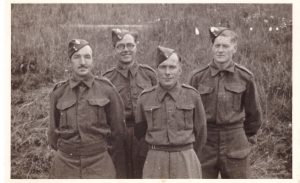
The book cover of ‘Captives of War’, featuring John Worsley’s painting of Marlag ‘O’, a camp for naval officers in Germany, drawn in February 1944. © National Maritime Museum
I am very pleased to announce that my book, Captives of War. British Prisoners of War in the Second World War is published by Cambridge University Press on 12 October 2017.
The book was inspired by a conversation I had with my grandfather many years ago. He had been a POW in Poland for almost five years. I was, as I often did, pestering him to write a memoir about his experience or, at the very least, record something on a Dictaphone, but he turned to me and asked “Why would I record my story? It would just be one long tale of humiliation.” At that moment, I realised an incongruity lay between him and me. I was so proud of my grandfather. I thought he was incredible for what he had been through, for what he had survived and witnessed, and for who he had become as a result. He, meanwhile, seemed embarrassed and ashamed. My attitude was, no doubt, informed by the contemporary society in which I lived: an era when the war victim or sufferer had become a heroic figure and when the masculine ideal was far from synonymous with martial prowess. I wanted to understand my grandfather’s perspective.
The result is a pioneering history of the experience of captivity of British prisoners of war in Europe during the Second World War, focussing on how these men coped and came to terms with wartime imprisonment. I reveal the ways in which POWs psychologically responded to surrender, the camaraderie and individualism that dominated life in the camps and how, in their imagination, they constantly breached the barbed wire perimeter to be with their loved ones at home. Through the diaries, letters and log books written by seventy-five POWs alongside psychiatric research and
reports I explore the mental strains that tore through POWs’ minds and the challenges they faced upon homecoming. The book tells the story of wartime imprisonment through the love, fears, fantasies, loneliness, frustration and guilt these men felt, shedding new light on what the experience of captivity meant for these men both during the war and after their liberation.
Captives of War has been endorsed by four extremely eminent historians. Here is what they’ve said about their advance copies:
Professor Joanna Bourke, Birkbeck, University of London: ‘Clare Makepeace is a rare historian able to combine depth of knowledge with exquisite sensitivity. By delving into the intimate lives of prisoners of war, Makepeace reveals the primacy of domestic ties in the inner lives of these captives, and emphasises the range and complexity of different masculinities. The book is a ‘must read’, not only for people curious about war and captivity, but also for anyone interested in the history of everyday lives’.
Dr Heather Jones, London School of Economics and Political Science: ‘This is a profoundly important new history of Second World War captivity. Through the experience of British prisoners of war, Clare Makepeace provides a groundbreaking appraisal of the impact of war upon masculine identity. A tour de force addition to the cultural history of modern warfare’.
Midge Gillies, author of The Barbed-Wire University: ‘Captives of War offers a rare combination of impeccable scholarship coupled with deep humanity for the men who lived through the history. Captives of War is teeming with vivid stories and compelling voices. Every page adds another level of understanding to what it must have been like to experience captivity. This riveting account will appeal to anyone fascinated by history – but also to any reader interested in how we respond to adversity’.
Professor Bob Moore, University of Sheffield: ‘By weaving together the diaries and letters of those involved with official sources, and with insights from Psychology, Sociology and History, Clare Makepeace shows what everyday captivity entailed for the many thousands of British servicemen captured by the Axis powers behind barbed wire. Carefully constructed and well-written, Captives of War breaks new ground in the understanding of the social and cultural history of British prisoners of war in the Second World War’.

